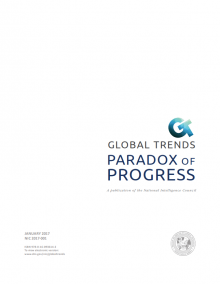Over the past few weeks, I’ve teed up the distant horizon point of view of “Global Trends: Paradox of Progress,” as well as three plausible scenarios for what kind of world we’ll find ourselves in decades hence. How these scenarios, Islands, Orbits, and Communities, play out will dominate how our world will be shaped in the future.
The three scenarios—”Islands,” “Orbits,” and “Communities“—explore how critical trends and choices might intersect to create different paths to the future. These scenarios postulate alternative responses to near-term volatility—at the national (Islands), regional (Orbits), and sub-state and transnational (Communities) levels. The names of the three Global Trends: Paradox of Progress scenarios: Islands, Orbits, and Communities are intriguing and bear a bit of explanation.
Here’s a look at ISLANDS, and how it might play out: This scenario investigates the issues surrounding a restructuring of the global economy that leads to long periods of slow or no growth, challenging the assumption that traditional models of economic prosperity and expanding globalization will continue in the future. The scenario emphasizes the difficulties for governance in meeting future societal demands for economic and physical security as popular pushback to globalization increases, emerging technologies transform work and trade, and political instability grows. This scenario underscores the choices governments will face in adjusting to changing economic and technological conditions that might lead some to turn inward, reduce support for multilateral cooperation, and adopt protectionist policies and others to find ways to leverage new sources of economic growth and productivity. The story of this scenario is told from the perspective of an economist reflecting on the twenty years since the 2008 global financial crisis.
Want more now? You can read Global Trends: Paradox of Progress here


